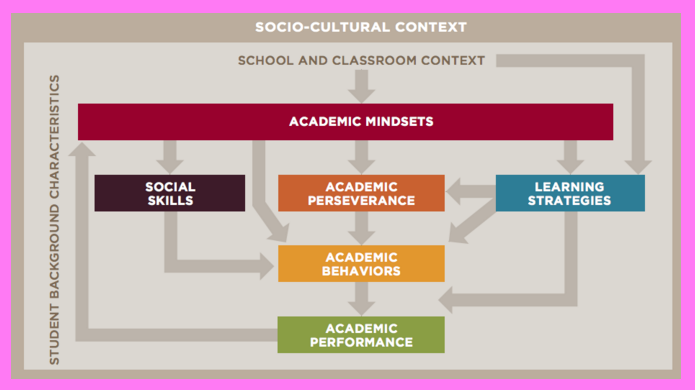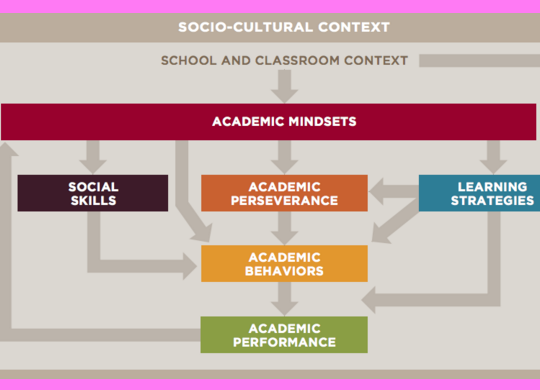

- Academic Behaviors:
- “good student” behaviors
- examples: high attendance, coming prepared to class, staying on task, completing homework, etc.
- important for achievement
- all other non-cognitive factors work through academic behaviors to get results
- Academic Perseverance:
- completing academic tasks on task to best of one’s ability despite challenges
- related attitudes: grit, persistence, delayed gratification, self discipline, self control
- Academic Mindsets:
- beliefs that relate to academic work
- 4 key examples:
- I belong in this academic community
- relates to idea that learning is a social activity
- feeling of belonging to a learning community improves student performance
- My ability and competence grow with effort
- growth mindset
- I can succeed at this
- people tend to embrace things they think they can do and avoid things they believe they can’t
- This work has value for me
- attainment value: doing well on a task
- intrinsic value: gaining enjoyment on task
- utility value: task serves an important purpose
- I belong in this academic community
- Learning Strategies:
- strategies that enhance thinking
- examples: strategies for …
- better recall
- monitoring comprehension
- self correcting
- goal setting
- time management
- Social skills:
- examples: cooperation, assertion, responsibility, empathy
- behaviors that improve social interactions
Their model of how these 5 factor relate to academic behavior is shown below:

- Interesting features of the model:
- academic mindsets can give rise to social skills, academic behaviors, academic perseverance, and learning strategies
- academic mindsets, social skills, academic perseverance, and learning strategies use academic behaviors as a vehicle for achieving academic performance
- using learning strategies can lead to more academic perseverance and more academic behaviors that lead to academic performance
- academic performance can influence academic mindsets

Knowing the research-backed factors that improve academic performance can help teachers plan classroom management systems that build the skills, mindsets, and attitudes that support academic success. Having a model for how these factors interact can help one understand how focusing on one factor can influence the other factors.

Preparation Steps
- Conduct more research on factors related to academic success. See Agency articles and hyperlinked articles above for ideas.
- Create character learning targets based on key features of 5 non cognitive factors listed above
- Research strategies and activities that can be implemented to reach character learning targets related to 5 non cognitive factors
Early Implementation Steps
- Throughout the year, facilitate activities and strategies that help students reach character learning targets
- Use formative assessments and related reflections related to Agency rubric to see if activities and strategies are improving students’ agency
Advanced Implementation Steps
- Use student reflections and assessment results to identify most effective strategies. Incorporate these into classroom routines.
- Use model (see graphic above) to help students see and reflect upon the connections between skills, attitudes, behaviors and performance

- Agency articles
- Collaboration articles
